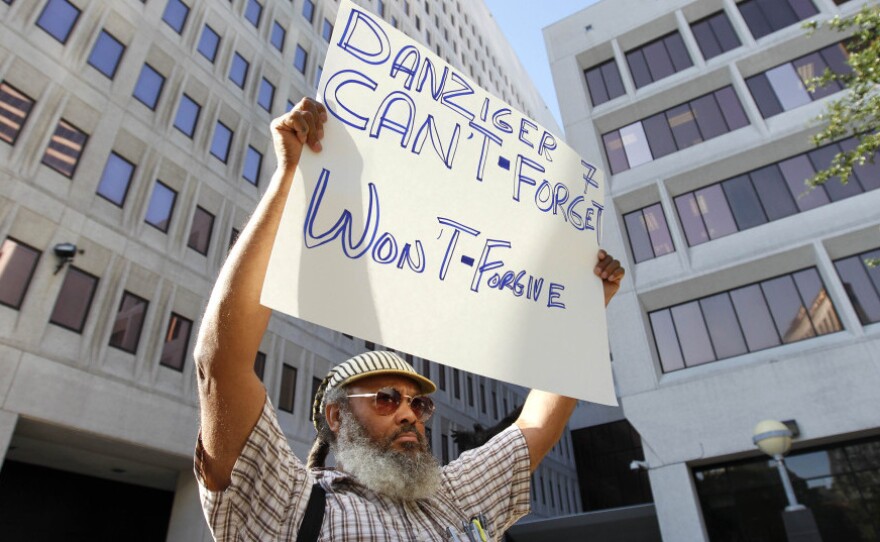On Aug. 5, a federal jury handed down one of the most sweeping verdicts in the modern history of American police brutality cases. Five New Orleans police officers were convicted of various roles in gunning down civilians in the days after Hurricane Katrina, and then covering it up. Five other officers pleaded guilty.
The Danziger Bridge case, as it's called, adds momentum to a reform effort already under way. The Department of Justice says it's committed to cleaning up the New Orleans Police Department, once and for all.
'This Will Not Stand'
After the grueling seven-week trial, Barbara "Bobbi" Bernstein, the lead prosecutor who came down from the Justice Department in Washington to try the case, decided to get out and enjoy New Orleans. And a remarkable thing happened. Everywhere she went — on the sidewalks, in her hotel, in a Catholic church — people came up to hug her and thank her.
Such was the gratitude of the people of New Orleans that someone had fought back against rogue cops, and sent a message to the police department — this will not stand.
Not The First Attempt To Reform Police
The misdeeds of the NOPD are infamous.
"In the '90s, we had officers arrested and prosecuted and [who] went to jail for rapes, for arson, kidnappings, killings, drugs, bank robberies," said Mary Howell, a local attorney who has represented victims of police abuse for more than 30 years.
"We had a police officer who used to do bank robberies on his lunch break. He went to prison. He's out now. So we've been here before."
"Been here before" means attempts to reform the New Orleans police.
After a string of police atrocities in the '90s — which sent two officers to death row for capital murder — the Justice Department came to town to clean up the force. Prosecutors stayed from 1996 to 2004, at which time most people thought the problems had been solved.
Then came Katrina, during which there were many instances of police bravery, but also more misconduct
It became apparent that the eight-year effort overseen by the Justice Department did not hold.
"Sometime between 2005 and 2010 the train came off the tracks and crashed," says current police Superintendent Ronal Serpas. "It's really a frightening case study of how fast it can all come apart."
Detail System An 'Aorta Of Corruption'
Last year, New Orleans Mayor Mitch Landrieu invited the Justice Department back to town to help straighten out the police department again. In March, the department's Civil Rights Division released a scathing, 150-page investigation detailing "systemic" problems within the NOPD. Among them: excessive force, illegal stops and searches, uncontrolled attack dogs, sloppy investigations of officer wrongdoing, poor hiring, poor training, poor supervision, and the notorious detail system, whereby officers can earn extra money pulling off-duty security details for things like parades.
"Within the New Orleans Police Department there is a culture, and that culture is very unusual," said Tony Radosti, a 23-year veteran of the force who now works for the Metropolitan Crime Commission, a police watchdog group. Radosti says it was an open practice in the department for officers to use the detail system to enrich themselves and their buddies.
"We've had some issues that police officers during Carnival a few years back were paid $100 an hour, three of 'em, to protect a porno shoot in the French Quarter," Radosti said.
Tom Perez, assistant attorney general for civil rights, oversaw the Justice Department's report on the NOPD. "The detail system was certainly an aorta of corruption in the police department," Perez said, in an interview from his Washington office.
The new chief, Serpas, spent 21 years on the force. He left to run other police agencies and returned, he says, anxious to bring about change. Serpas has tightened up the detail system, fired or sidelined bad commanders, and put teeth in internal affairs reviews of officer misconduct.
"If you are untruthful, first time, you're terminated," he said, "We have dismissed more than 35 people in the last 15 months. It's probably up to 37 or 38 now. And we have suspended 200 people."
Will Reform Stick?
But can the department change a culture of cover-up? The Danziger verdict was the third federal trial in the past eight months in which New Orleans police officers were found guilty of killing innocent suspects, then lying about it.
"We've had reform before," said lawyer Howell. "The question is, what's different now? How are we gonna be able to really have reform that will last?"
Washington's answer: This time the Justice Department is negotiating a consent decree with the NOPD, under which a federal judge will ensure that dozens of recommendations are carried out.
"With the benefit of our experience from the late '90s, we learned that we need a consent decree that has court oversight," said Tom Perez, of the Justice Department. We will have a monitor. We will stay in New Orleans as long as is necessary to get the job done and not a day longer."
Community Hopeful For Change
Winning the trust of the community will be a slow process.
The Madison family used to believe in the New Orleans Police Department. The family has relatives and friends known as good officers, though there were always rumors that the NOPD had a dark side. But the Danziger Bridge incident shattered the family's peace of mind.
In the days after the storm flooded the city, Ronald Madison, who was 40 years old and mentally disabled, along with his brother, Lance, were peacefully walking across the bridge when officers — mistaking them for hoodlums — opened fire. One officer fatally shot Ronald in the back, and another policeman stomped him as he lay dying on the pavement. Then the police falsely accused Lance of firing at officers; those charges were later dropped.
"We never thought something like this would happen to us. We're not scoundrels. We're law-abiding," said Dr. Romell Madison, a respected New Orleans dentist and brother of Ronald and Lance.
"They're going to have to look deep within the screening or psychological evaluation of the individuals they do allow to carry a badge and a gun," he continued, sitting in his office located near the base of the bridge where his brother died. "They have to be able to control their use of deadly force, not just let their emotions take over and say, 'OK, I think he has a weapon so I'm going to shoot him.' "
His sister, Jackie Madison Brown, a dialysis nurse, added that officers who do their job shouldn't have to cover up for one another with a "code of silence."
"We are hopeful there will be change," she said, "But we know it won't happen overnight."
Copyright 2022 NPR. To see more, visit https://www.npr.org. 9(MDAzMjM2NDYzMDEyMzc1Njk5NjAxNzY3OQ001))







